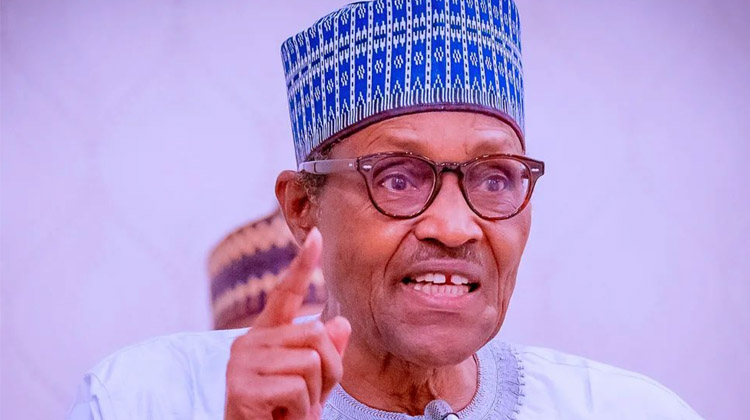Buhari’s parting gift of executive dictatorship
Even as Nigerians are coming to terms with the various outcomes of the recent general polls, a new twist which has the portends of impacting the polity negatively is rearing its head. Last week the President of the Senate Ahmed Lawan announced at plenary that out of 35 constitution amendment bills sent to President Muhamadu […]

Even as Nigerians are coming to terms with the various outcomes of the recent general polls, a new twist which has the portends of impacting the polity negatively is rearing its head. Last week the President of the Senate Ahmed Lawan announced at plenary that out of 35 constitution amendment bills sent to President Muhamadu Buhari for assent, only 16 were assented to while 19 were denied the assent. Among those denied assent were several bills that not only betrayed the diminished premium granted the legislature by the Presidency, but also put in graphic relief, a measure of the contempt with which the executive views the liberty of the generality of the Nigerian citizenry, to determine how they are to be governed.
More significantly is that if the president’s position stands, it will be his parting gift of executive dictatorship which is imposed on Nigerians, even after eight full years of his draconian run in governance. If allowed to stand it will mean that any President after Buhari will be able to rule in any manner of his or her choice without challenge, including ordering citizens’ flesh for dinner!
Among the offending bills which were denied assent are firstly the bill authorising the National Assembly and state assemblies to summon the President and state governors respectively, to provide answers to questions on matters of public interest, as circumstances may warrant. This incidentally is the foundation of the oversight powers granted the legislature by the Constitution. To deny such a bill the constitutional assent by the President, constitutes a frontal assault to the Constitution itself.
Another is the bill seeking to include past leadership or more precisely the presiding officers of the National Assembly in the membership of the Council of State. Presently, the Constitution grants membership of the Council of State to serving and past Presidents as well as heads of governments of the federation, all former Chief Justices of Nigeria, President of the Senate and Speaker of the House of Representatives, serving Governors and the Attorney Generals of the various states, and lastly but not the least is the Attorney General of the Federation. Conspicously missing in that elite body is the participation of the past presiding officers of the National Assembly. The killing of this bill therefore constitutes an extension of the negation of the valued contributions of this crop of past leaders of the National Assembly, which is not only the very crucible and symbol of democracy in the country but with qualified emphasis, the voice of Nigerians.
Maternal malnutrition; the silent killer
The incoming government must create jobs
Yet other victims of the President’s guillotine are the bills on enforcement of legislative summons on any citizen in the country, a constitutionally determined time-frame for submission of annual budgets by the executive to the legislature, and the provision of the state of the nation as well as state of the state addresses by the President or state governor as the case may apply. This provision which remains the crowning feature of accountability in democratic rule, was turned down by the President even at the twilight of his tenure, and even when he has nothing to fear as he will be out of office and need not be bothered. By its implementation.
In his comment on the development at plenary, Lawan promised that the National Assembly would continue to interface with the executive arm to resolve the truncation of the bills by the President, ostensibly these bills which qualify as the denegraetion of the legislative arm of government. In a seeming effort to comfort Nigerians over the unmistakable disappointment from Buhari, Lawan has mooted the prospects of the National Assembly engaging the executive over the development and if such efforts fail the exercise would be deferred to the incoming 10th National Assembly. This is to pass the buck to the 10th National Assembly which will not only roll back the gains made so far by the country on the Constitution amendment exercise, and render the enterprise a long indeterminate wait for Godot.
However, while Lawan is in defence of the Ninth National Assembly expecting plaudits for a job well done over the constitutional amendment bills, hardly does the situation commend itself for applause. Rather not a few Nigerians would have the National Assembly tow a different line from the executive’s, right from the onset as the entire drama constitutes a slap on the face of the National Assembly. To see the response of the President otherwise is to misread the charade of the President cherry-picking the bills to assent to and otherwise. Put succinctly, what Nigerians expect from the Senate is the initiation of fast-track procedure towards a veto of the President’s denial of assent to the various bills.
For if at the twilight of its tenure the Ninth National Assembly should consider any bill as sacrosanct, the various bills that were axed by the President should qualify as such. It needs to be considered that as far as majority of Nigerians are concerned, all through the longer part of its tenure, the Ninth National Assembly had indulged in a rather questionably cosy relationship with the executive arm – and often to the detriment of the public good.
Allowing itself to sink at valediction from office into posterity and into the cesspool of infamy for acting against public weal is what the Ninth National Assembly should avoid at all costs.
